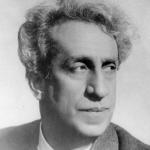
On 2 February the opera Eugene Onegin and on 8 February the ballet Swan Lakewill be performed in honour of Ariy Pazovsky to commemorate the one hundred and thirtieth anniversary of his birth. The Dress Circle foyer of the historic Mariinsky Theatre will host an exhibition of documents and photographs from the theatre's archives.
2 February marks one hundred and thirty years since the birth of Ariy Moiseyevich Pazovsky (1887–1953) – Principal Conductor of the Mariinsky (Kirov) Theatre from 1936–1943.
Born in Perm, Pazovsky began his music career as a violinist, studied at the St Petersburg Conservatoire under the renowned Leopold Auer and conversed with Anatoly Lyadov. In 1905 he began his conducting career in his native Perm, subsequently conducting operas in Kazan, Saratov, Minsk, Vilnius, Tbilisi and Baku among other cities. From 1908–1910 he collaborated with the Zimin Private Opera in Moscow, where he made his debut with Serov's Judith. His rich impressions from his Moscow years formed the conductor's artistic views. His years of travelling (Kharkov, Odessa, Kiev and Tbilisi) once again brought Pazovsky back to St Petersburg – Petrograd, where in 1918 he worked at the Petrograd House of the Peoples and became close friends with Samuil Samosud and Fyodor Chaliapin. The 1920s were a time for new tours and working at the Bolshoi Theatre, where Pazovsky conducted, among other productions, Boris Godunov (1927), as part of which the previously censored scene at St Basil's Cathedral was performed for the first time. Pazovsky directed opera houses in Sverdlovsk (1931–1933); here he remains well-remembered for his performances of The Tale of Tsar Saltan, The Tsar's Bride and Prince Igor) and in Kiev (1933–1936). In 1936, following the resignation of Vladimir Dranishnikov, Pazovsky was appointed Principal Conductor of the Kirov Theatre in Leningrad. Here he conducted new productions of The Tale of Tsar Saltan, Carmen and Ivan Susanin, and there also came the premiere of Oles Chishko's Battleship Potemkin (1937). Pazovsky had the honour of reviving Tchaikovsky's The Enchantress on the Russian stage (1941).
While Pazovsky was working, a difficult period in Leningrad's history began because of WW II. Evacuation was on the threshold: the theatre, like the Philharmonic, was to be sent to Novosibirsk. Pazovsky convinced Party leaders to leave the company in Molotov (as Perm was known at the time), where theatre life was resumed, reviving almost the entire opera and ballet repertoire. In September 1941 Pazovsky conducted the first performance by the Kirov Theatre during its evacuation – Glinka's Ivan Susanin. Here in 1942 came the premiere of the opera Yemelyan Pugachev by Marian Koval and Dmitry Rogal-Levitsky, and in late 1943 came a new production of Rimsky-Korsakov's Christmas Eve.
Soon Pazovsky was to be appointed Principal Conductor of the Bolshoi Theatre – the only conductor to have held this post at the country's two most important theatres. Due to illness in 1948 Pazovsky ended his conducting career, ceding his position at the Bolshoi Theatre to Nikolai Golovanov. The conductor's work was preserved for posterity in numerous recordings.
Ariy Pazovsky won the Stalin Prize on three occasions and was awarded the title of People's Artist of the USSR.